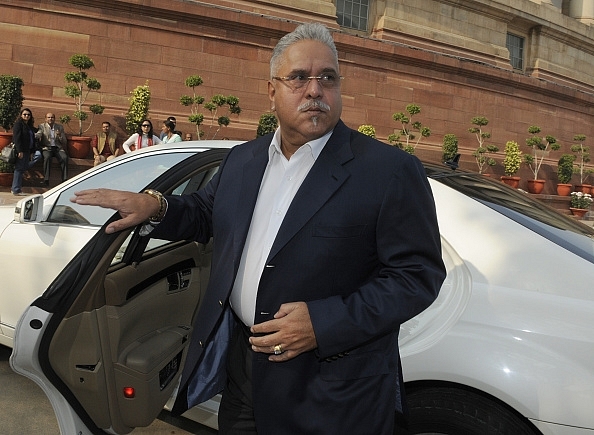Business
Poser For India: Do We Want To Recover Mallya’s Loans Or Just Humiliate Him?
- By seeking extradition and allowing media trials, banks face the prospect of losing it all, or most of the money lent.
- Humiliation of Mallya cannot be India’s goal. It should be recovery of as much of the loans as possible.

Vijay Mallya in Parliament. (GettyImages)
Even as Indian banks swallow hard and take the plunge to recover bad loans from businesses that failed, if necessary by filing for liquidation, it is not following the same script with another defaulter – liquor baron Vijay Mallya. In Mallya’s case, the interest seems to be about dragging him home from his London redoubt rather than just the recovery of the money.
India did not cover itself with glory at the last hearing in London for the extradition of Mallya, who owes banks more than Rs 9,000 crore borrowed on the Kingfisher Airlines account. This was because the Central Bureau of Investigation had not yet provided the proof needed to make its case for a quick hearing. Mallya left the country in February last year when it seemed as if the investigators were close to arresting him.
Kingfisher went bust in 2011, and if in 2017 the Indian investigative agencies still don’t have the proof to extradite a businessman who they accuse of diverting funds and money-laundering, then it simply shows that we do not know how to gather evidence and file a foolproof case.
This is showing up as a traditional weakness among Indian agencies, which consider defaults due to business failures a crime, whereas in the other parts of the world, failure is just something that happens. Moreover, if you want to prove a criminal intent to defraud, your evidence must be even stronger. Courts abroad take a dim view of investigating agencies leaking damaging evidence against an accused to the media, which could lead to charges of mistrial or prejudice against the accused.
In India, we have already – in various TV channels and print stories – declared Mallya a criminal. The evidence may still be there to prove his criminality – recent reports suggest that he may have diverted money lent to Kingfisher to fund his IPL team – Royal Challengers – but this evidence needs to be acceptable to a court of law. Mallya has anyway denied this story.
In fact, the various media trials going on in Mallya’s case may well prompt the UK courts to conclude that he will not get fair treatment in India, and refuse the extradition request. As things stand, the Supreme Court has already declared Mallya to be in contempt for refusing to disclose his assets properly, and for transferring $40 million to his children despite the court ordering him to freeze the money and respond to summonses to appear in court.
If Mallya does not appear before the court on 10 July, it will probably order his arrest for contempt. But this too will require extradition, and the UK courts may have to respond to this situation by deciding whether someone convicted in another country can be allowed to stay in their country.
However, with or without extradition, the two real issues are these: should bad business decisions and failure be considered a crime? And, secondly, assuming a business goes bust, should our priority be to hound the businessman or recover whatever money is still possible from the underlying assets?
In India, we seem to be confused on both issues. We seem to think that business failure is some sort of crime, since public sector banks have been stuck with bad loans. And we also seem to believe that loan defaulters must be humiliated or arrested, and recovery of the loan is only a secondary objective.
This is a huge mistake. While there can surely be criminality in loan sanctions, this needs to be proven. In Mallya’s case, it is suspected that political pressure may have caused nationalised banks to lend him more money even though Kingfisher was looking unviable, but this type of suspicion is difficult to prove. This line of enquiry may not go anywhere.
On the other hand, it is far better to seek to settle as much of the loan as possible, using both available collateral and pledged assets, and, if needed, making a law to confiscate the assets of absconders, as the government seems to be planning.
In fact, the best way to get Mallya back home is to attach his properties and force him to settle as much of the loan as possible. Logically, banks should be willing to waive off the accumulated interest as long as the main principal sums are paid. Most bankers would be happy with this kind of settlement. By seeking extradition and allowing media trials, banks face the prospect of losing it all, or most of the money lent.
Humiliation of Mallya cannot be India’s goal. It should be recovery of as much of the loans as possible.
(A part of this article was first published by Dainik Bhaskar)
Support Swarajya's 50 Ground Reports Project & Sponsor A Story
Every general election Swarajya does a 50 ground reports project.
Aimed only at serious readers and those who appreciate the nuances of political undercurrents, the project provides a sense of India's electoral landscape. As you know, these reports are produced after considerable investment of travel, time and effort on the ground.
This time too we've kicked off the project in style and have covered over 30 constituencies already. If you're someone who appreciates such work and have enjoyed our coverage please consider sponsoring a ground report for just Rs 2999 to Rs 19,999 - it goes a long way in helping us produce more quality reportage.
You can also back this project by becoming a subscriber for as little as Rs 999 - so do click on this links and choose a plan that suits you and back us.
Click below to contribute.
Latest